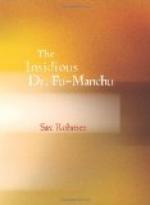“At last I stand in the house of Dr. Fu-Manchu!” whispered Smith.
Despite the girl’s assurance, we knew that proximity to the sinister Chinaman must be fraught with danger. We stood, not in the lion’s den, but in the serpent’s lair.
From the time when Nayland Smith had come from Burma in pursuit of this advance-guard of a cogent Yellow Peril, the face of Dr. Fu-Manchu rarely had been absent from my dreams day or night. The millions might sleep in peace—the millions in whose cause we labored!—but we who knew the reality of the danger knew that a veritable octopus had fastened upon England— a yellow octopus whose head was that of Dr. Fu-Manchu, whose tentacles were dacoity, thuggee, modes of death, secret and swift, which in the darkness plucked men from life and left no clew behind.
“Karamaneh!” I called softly.
The muffled form beneath the lamp turned so that the soft light fell upon the lovely face of the slave girl. She who had been a pliant instrument in the hands of Fu-Manchu now was to be the means whereby society should be rid of him.
She raised her finger warningly; then beckoned me to approach.
My feet sinking in the rich pile of the carpet, I came through the gloom of the great apartment in to the patch of light, and, Karamaneh beside me, stood looking down upon the boy. It was Aziz, her brother; dead so far as Western lore had power to judge, but kept alive in that deathlike trance by the uncanny power of the Chinese doctor.
“Be quick,” she said; “be quick! Awaken him! I am afraid.”
From the case which I carried I took out a needle-syringe and a phial containing a small quantity of amber-hued liquid. It was a drug not to be found in the British Pharmacopoeia. Of its constitution I knew nothing. Although I had had the phial in my possession for some days I had not dared to devote any of its precious contents to analytical purposes. The amber drops spelled life for the boy Aziz, spelled success for the mission of Nayland Smith, spelled ruin for the fiendish Chinaman.
I raised the white coverlet. The boy, fully dressed, lay with his arms crossed upon his breast. I discerned the mark of previous injections as, charging the syringe from the phial, I made what I hoped would be the last of such experiments upon him. I would have given half of my small worldly possessions to have known the real nature of the drug which was now coursing through the veins of Aziz—which was tinting the grayed face with the olive tone of life; which, so far as my medical training bore me, was restoring the dead to life.
But such was not the purpose of my visit. I was come to remove from the house of Dr. Fu-Manchu the living chain which bound Karamaneh to him. The boy alive and free, the Doctor’s hold upon the slave girl would be broken.
My lovely companion, her hands convulsively clasped, knelt and devoured with her eyes the face of the boy who was passing through the most amazing physiological change in the history of therapeutics. The peculiar perfume which she wore—which seemed to be a part of her— which always I associated with her—was faintly perceptible. Karamaneh was breathing rapidly.




